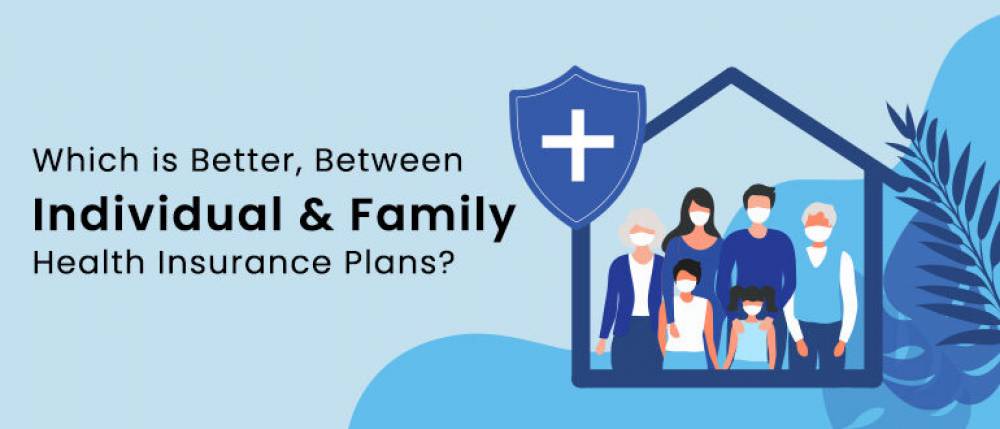Subscribe to get weekly insights
Always stay up to date with our newest articles sent direct to your inbox
Published on 6 Feb, 2023
Updated on 13 Feb, 2024
2666 Views
3 min Read

Written by Care Health Insurance
favorite0Like
favoriteBe the First to Like
Whether big or small– your family is the top priority. When trying to secure the healthcare needs of the family members, you might get puzzled by the type of insurance coverage to opt for. While a family floater policy covers every member under one sum insured, separate health insurance plans secure members individually. You pay a single, combined premium for a family policy as compared to separate premium payments for individual plans.
In this article, let’s evaluate the difference between individual and family health insurance plans with the help of practical examples.
The individual and family floater health insurance plans affect your savings differently. While an individual health plan requires separate premium payments for each family member insured, the family floater plan requires payment of a single premium.
Here is a case study to understand how the premium payment takes place in each type of health insurance plan.
Mohan and Mudit, aged 35 years, are IT professionals in the fintech industry. They are planning to secure their family of four under an appropriate health insurance plan. Take a look at their different scenarios:
Let us see how much they spend on health insurance premiums:
| Members to be Insured | Total Cost for Individual Health Insurance Plans(₹) | Total Cost for Family Floater Insurance Plan (₹) | Total Cost Difference |
|---|---|---|---|
| Self (Age=35) | 10,571* | 19220 | 16427 |
| Wife (Age=32) | 10,571* | ||
| Son (Age=10) & Daughter (Age=7) | 14,505* | ||
| Total Cost | 35647 | 19220 | 16427 |
*Disclaimer: The above policy rates are subject to specific policy terms and conditions and may be changed as per the company policy.
From the above example, we can observe that with the Care Supreme- Family Floater Plan, Mudit has saved more than 53% in annual premium, i.e., ₹16,427.
Moreover, if you buy three-year health coverage with Care Insurance, you get an additional discount of 10% on the total premium. However, this discount is applicable only to select policies, i.e., Care and Care Advantage Plans, subject to the terms & conditions as mentioned in the policy documents.
While choosing between individual and family health insurance, you must consider the following aspects:
If your elderly parents are more than 30 years older than you, adding them to your family floater cover is not a good idea. Due to their old age, doing so will result in a high premium, as the cost is calculated based on the eldest member’s age. Moreover, the coverage amount available to your parents might be insufficient. Hence, it is better to opt for a family health insurance policy for your spouse and children and buy a separate plan for senior citizens, e.g., Care Senior plan for your parents.
All family members have different health conditions requiring different healthcare services. For instance, elderly parents might suffer from high blood pressure, hypertension, diabetes, or other pre-existing diseases. If your family members have special medical needs, you should provide them with separate health covers for maximum security.
Suppose your family has a history of diabetes, blood pressure, or other chronic ailments like cardiac diseases. In such cases, you should protect your family members with adequate coverage for critical illnesses and their treatment expenses. Thus, you can opt for a standard family cover for basic healthcare expenses and separate critical illness plans as a security for severe illnesses.
To sum up, different health conditions need different types of coverage. Hence, you should carefully consider the factors, cost, and health needs of every family member before making a choice. If you need any guidance, you can always reach out to Care Support Assistance, which will help you buy the right health insurance for your family.
favoriteBe the First to Like
Thyroid : मामूली नहीं हैं महिलाओं में थायराइड होना, जानें इसके लक्षण और घरेलू उपचार Vipul Tiwary in Diseases
शुगर कंट्रोल कैसे करे? जानें, डायबिटीज में क्या खाना चाहिए Vipul Tiwary in Health & Wellness
हाई ब्लड प्रेशर को तुरंत कंट्रोल कैसे करें? देखें इसके उपाय Vipul Tiwary in Diseases
पैरों में दर्द किस कमी से होता है? जानें, इसके घरेलू इलाज Vipul Tiwary in Health Insurance Articles
Neglecting Oral Health and Hygiene? Your Brain Could Suffer the Consequences Jagriti Chakraborty in Mental Health
Unlock Your Health: Protein Powder for Women and Key Supplements Jagriti Chakraborty in Diet & Nutrition
Forget Yoghurt: 8 Probiotic Foods That Actually Work Jagriti Chakraborty in Health & Wellness
BIG Update: Nipah Virus Is Back, Here’s How to Stay Safe! Sejal Singhania in Health Insurance Articles
Always stay up to date with our newest articles sent direct to your inbox
Loading...